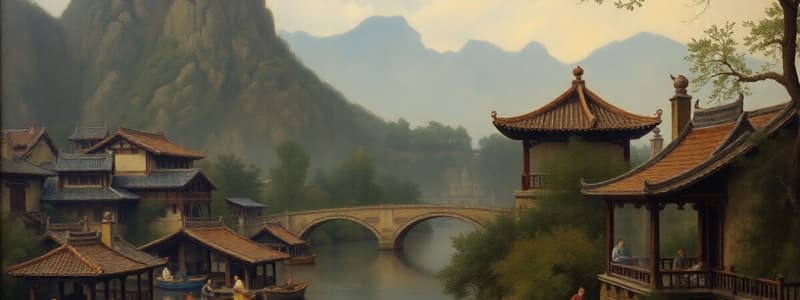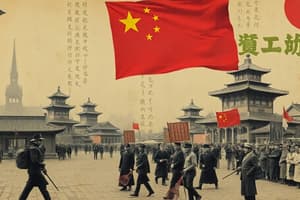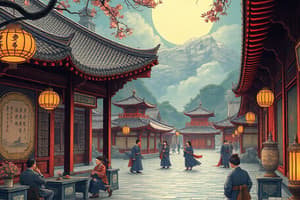Podcast
Questions and Answers
What percentage of the Chinese population identifies as the Han ethnic group?
What percentage of the Chinese population identifies as the Han ethnic group?
- 85%
- 90% (correct)
- 95%
- 70%
What was one major consequence of the construction of the Three Gorges Dam?
What was one major consequence of the construction of the Three Gorges Dam?
- Creation of millions of kilowatts of electricity (correct)
- Destruction of natural habitats and historic sites (correct)
- Improved access to clean water
- Increased arable land in the North
What significant action did the Chinese government take in the 1970s regarding population control?
What significant action did the Chinese government take in the 1970s regarding population control?
- Implemented a two-child policy
- Encouraged high birth rates
- Establish a population census
- Enforced a one-child policy (correct)
Which of the following rivers is NOT mentioned as a major river in China?
Which of the following rivers is NOT mentioned as a major river in China?
What philosophical influence significantly impacted the Han dynasty's governance?
What philosophical influence significantly impacted the Han dynasty's governance?
What event in 1911 marked a significant change in China's political landscape?
What event in 1911 marked a significant change in China's political landscape?
Which party became the dominant political force in China by 1928?
Which party became the dominant political force in China by 1928?
How did Mao Zedong's approach to communism differ from traditional Marxism?
How did Mao Zedong's approach to communism differ from traditional Marxism?
What significant support did the Soviet Union provide during the rise of the KMT and CCP?
What significant support did the Soviet Union provide during the rise of the KMT and CCP?
What major consequence did foreign pressures have on China during this period?
What major consequence did foreign pressures have on China during this period?
What best describes the purpose of Special Economic Zones established in 1979?
What best describes the purpose of Special Economic Zones established in 1979?
Which movement rejected widespread foreign interference in China and called for its modernization?
Which movement rejected widespread foreign interference in China and called for its modernization?
What does the term 'ghost cities' refer to in the context of China?
What does the term 'ghost cities' refer to in the context of China?
Which of the following terms was used to describe those who did not fully support Mao and the revolution?
Which of the following terms was used to describe those who did not fully support Mao and the revolution?
In which year did the Hundred Flowers Campaign begin?
In which year did the Hundred Flowers Campaign begin?
What significant change did the construction of the Three Gorges Dam cause?
What significant change did the construction of the Three Gorges Dam cause?
Which of the following factors contributed to the longevity of the dynastic period in China?
Which of the following factors contributed to the longevity of the dynastic period in China?
What was a direct consequence of the Opium Wars for China?
What was a direct consequence of the Opium Wars for China?
What major event did Sun Yat-Sen's efforts lead to?
What major event did Sun Yat-Sen's efforts lead to?
Which strategy did Mao Zedong employ to gain support during the late 1920s?
Which strategy did Mao Zedong employ to gain support during the late 1920s?
Which issue contributed to the decline of the Nationalist government after WWII?
Which issue contributed to the decline of the Nationalist government after WWII?
What was the outcome of Mao's Hundred Flowers Movement?
What was the outcome of Mao's Hundred Flowers Movement?
What was the goal of the Great Leap Forward initiated by Mao?
What was the goal of the Great Leap Forward initiated by Mao?
What was one of the key focuses during the Cultural Revolution?
What was one of the key focuses during the Cultural Revolution?
What key factor contributed to the long-term unity of China despite frequent changes in dynasties?
What key factor contributed to the long-term unity of China despite frequent changes in dynasties?
During which dynasty did China lead the world in science and technology?
During which dynasty did China lead the world in science and technology?
Which event caused China to fall behind Europe in terms of innovation during the Ming dynasty?
Which event caused China to fall behind Europe in terms of innovation during the Ming dynasty?
What was a contributing factor to China's reduced entrepreneurial spirit during the Ming dynasty?
What was a contributing factor to China's reduced entrepreneurial spirit during the Ming dynasty?
What major international event in 1839 involved China and significantly impacted its trade relations?
What major international event in 1839 involved China and significantly impacted its trade relations?
Which of the following was NOT a reason cited for China's lack of innovation?
Which of the following was NOT a reason cited for China's lack of innovation?
How did geographical factors affect China's development during its early unification?
How did geographical factors affect China's development during its early unification?
What main conflict arose from China's reluctance to engage in trade with Britain?
What main conflict arose from China's reluctance to engage in trade with Britain?
What was a significant outcome of the Hundred Flowers Campaign initiated by Mao?
What was a significant outcome of the Hundred Flowers Campaign initiated by Mao?
What was one of the main goals of the Second Five Year Plan?
What was one of the main goals of the Second Five Year Plan?
How did the Four Evils campaign contribute to the Chinese famine?
How did the Four Evils campaign contribute to the Chinese famine?
What was a consequence of the Great Migration during Mao's era?
What was a consequence of the Great Migration during Mao's era?
What did Mao aim to eliminate during the Cultural Revolution?
What did Mao aim to eliminate during the Cultural Revolution?
What sparked the Tiananmen Square Incident in June 1989?
What sparked the Tiananmen Square Incident in June 1989?
Which of the following reflects a result from Mao's Second Five Year Plan?
Which of the following reflects a result from Mao's Second Five Year Plan?
What was the fate of the Gang of Four after Mao's death?
What was the fate of the Gang of Four after Mao's death?
Which military strategy did the Chinese Communists employ during the Civil War?
Which military strategy did the Chinese Communists employ during the Civil War?
What was the primary reason for the United States' support of the Chinese Nationalists during the Civil War?
What was the primary reason for the United States' support of the Chinese Nationalists during the Civil War?
What event was marked by the Tiananmen Square Incident in 1989?
What event was marked by the Tiananmen Square Incident in 1989?
How did Mao's policies affect the agricultural production during the Second Five Year Plan?
How did Mao's policies affect the agricultural production during the Second Five Year Plan?
Which significant event happened shortly after Mao's death in 1976?
Which significant event happened shortly after Mao's death in 1976?
During which event did Mao exceptionally control news through propaganda?
During which event did Mao exceptionally control news through propaganda?
What was the social impact of the Great Migration in China?
What was the social impact of the Great Migration in China?
Flashcards
China's population density
China's population density
Most of China's population lives in the south and along the coast due to favorable climate, arable land, and rainfall.
China's major rivers
China's major rivers
The Yellow River and Yangtze River are crucial to China's economy and history.
China's 'One Child Policy'
China's 'One Child Policy'
A population control policy implemented in the 1970s to limit births.
Qin Dynasty's impact
Qin Dynasty's impact
Signup and view all the flashcards
Confucianism's influence
Confucianism's influence
Signup and view all the flashcards
China's Post-Han Period
China's Post-Han Period
Signup and view all the flashcards
Chinese Bureaucracy
Chinese Bureaucracy
Signup and view all the flashcards
Ming Dynasty (1368-1644)
Ming Dynasty (1368-1644)
Signup and view all the flashcards
European Renaissance
European Renaissance
Signup and view all the flashcards
Chinese Ban on Sea Travel
Chinese Ban on Sea Travel
Signup and view all the flashcards
Opium Wars (1839)
Opium Wars (1839)
Signup and view all the flashcards
Confucian Thought
Confucian Thought
Signup and view all the flashcards
Lack of Innovation
Lack of Innovation
Signup and view all the flashcards
What led to the decline of the Qing dynasty?
What led to the decline of the Qing dynasty?
Signup and view all the flashcards
What caused the rise of the Nationalist Party (KMT)?
What caused the rise of the Nationalist Party (KMT)?
Signup and view all the flashcards
Why did the Soviet Union support both the KMT and the CCP?
Why did the Soviet Union support both the KMT and the CCP?
Signup and view all the flashcards
What caused the CCP's shift under Mao Zedong?
What caused the CCP's shift under Mao Zedong?
Signup and view all the flashcards
What became of the KMT's rule?
What became of the KMT's rule?
Signup and view all the flashcards
Three Gorges Dam
Three Gorges Dam
Signup and view all the flashcards
China's Size and Population
China's Size and Population
Signup and view all the flashcards
China's Resources
China's Resources
Signup and view all the flashcards
China's Cities
China's Cities
Signup and view all the flashcards
Confucianism and the Dynasties
Confucianism and the Dynasties
Signup and view all the flashcards
Taiping Rebellion
Taiping Rebellion
Signup and view all the flashcards
Opium Wars
Opium Wars
Signup and view all the flashcards
Xinhai Revolution
Xinhai Revolution
Signup and view all the flashcards
Sun Yat-Sen
Sun Yat-Sen
Signup and view all the flashcards
Long March
Long March
Signup and view all the flashcards
Ghost Cities
Ghost Cities
Signup and view all the flashcards
Mega City
Mega City
Signup and view all the flashcards
Special Economic Zones (SEZ)
Special Economic Zones (SEZ)
Signup and view all the flashcards
May 4th Movement
May 4th Movement
Signup and view all the flashcards
Cultural Revolution
Cultural Revolution
Signup and view all the flashcards
Reactionary
Reactionary
Signup and view all the flashcards
Hundred Flowers Campaign
Hundred Flowers Campaign
Signup and view all the flashcards
Organization of the Communist Party
Organization of the Communist Party
Signup and view all the flashcards
Rape of Nanking
Rape of Nanking
Signup and view all the flashcards
Chinese Civil War (1945-49)
Chinese Civil War (1945-49)
Signup and view all the flashcards
Guerrilla Tactics
Guerrilla Tactics
Signup and view all the flashcards
Containment Policy
Containment Policy
Signup and view all the flashcards
Second Five-Year Plan
Second Five-Year Plan
Signup and view all the flashcards
Great Leap Forward
Great Leap Forward
Signup and view all the flashcards
Collectivization
Collectivization
Signup and view all the flashcards
Great Chinese Famine
Great Chinese Famine
Signup and view all the flashcards
Four Evils Campaign
Four Evils Campaign
Signup and view all the flashcards
Red Guards
Red Guards
Signup and view all the flashcards
Gang of Four
Gang of Four
Signup and view all the flashcards
Tiananmen Square Incident (1989)
Tiananmen Square Incident (1989)
Signup and view all the flashcards
First Tiananmen Square Incident
First Tiananmen Square Incident
Signup and view all the flashcards
Study Notes
Timeline of Chinese Events
- 1700 BCE: Chinese civilization under the Shang dynasty begins.
- 221 BCE: China unified under the Qin dynasty.
- 1839-1842: First Opium War takes place.
- 1911: Qing dynasty is overthrown.
- 1919: May Fourth movement takes place.
- 1921: Chinese Communist Party (CCP) is founded.
- 1934-1935: Long March takes place.
- 1937-1945: Sino-Japanese War.
- 1949: People's Republic of China (PRC) is founded.
- 1958-1960: Great Leap Forward.
- 1966-1976: Cultural Revolution.
- 1976: Mao Zedong dies.
- 1978: Deng Xiaoping comes to power and initiates economic reform and opening.
- 1989: Tiananmen Square Massacre.
- 2001: China joins the World Trade Organisation.
- 2008: Beijing Summer Olympics.
- 2013: Xi Jinping begins his first five-year term as president.
- 2018: Chinese constitution amended to remove term limits for the president, allowing Xi Jinping to rule beyond 2023.
Major Geographic and Demographic Features
- China has the second-largest population globally.
- Most people live in southern China and coastal areas due to higher rainfall, fertile land, and better temperatures.
- Two major rivers: Yellow River and Yangtze River.
- The large population and limited access to clean water and electricity have necessitated projects like the Three Gorges Dam, which, while providing electricity and flood control, destroyed historic sites.
Historical Development of China
- China has unified and divided through dynastic cycles, with centralized rule and periods of division.
- The Qin dynasty set precedents for centralized governance.
- Under the Han dynasty, Confucianism influenced governance and civil service.
- The Sui/Tang dynasties brought about reunification.
Studying That Suits You
Use AI to generate personalized quizzes and flashcards to suit your learning preferences.




